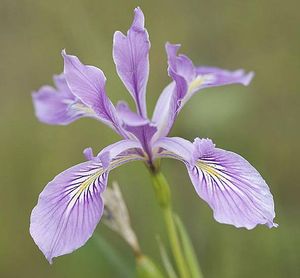Difference between revisions of "Iris tenax"
| (2 intermediate revisions by the same user not shown) | |||
| Line 3: | Line 3: | ||
* Common Names: Oregon flag, tough-leaf iris | * Common Names: Oregon flag, tough-leaf iris | ||
* Codon: IRITEN | * Codon: IRITEN | ||
| + | ---- | ||
[[File:IRITEN1.jpg |thumb|Photo by Rod Gilbert, also featured on Main Page]] | [[File:IRITEN1.jpg |thumb|Photo by Rod Gilbert, also featured on Main Page]] | ||
===Taxonomy=== | ===Taxonomy=== | ||
| Line 30: | Line 31: | ||
===Description=== | ===Description=== | ||
| − | + | Clump-forming herb growing from branched rhizomes, up to 3 dm tall.<ref name=":0">Bowcutt, F., & Hamman, Sarah. (2016). ''Vascular plants'' | |
| − | of the South Sound prairies'' (First ed.). Olympia, Washington: The Evergreen | + | of the South Sound prairies'' (First ed.). Olympia, Washington: The Evergreen'' |
State College Press.</ref> Stems are solid.<ref name=":1">Hitchcock, C. L., Cronquist, A., Giblin, D., & Legler, | State College Press.</ref> Stems are solid.<ref name=":1">Hitchcock, C. L., Cronquist, A., Giblin, D., & Legler, | ||
B. et al. (2018). ''Flora of the Pacific Northwest: an illustrated manual''. | B. et al. (2018). ''Flora of the Pacific Northwest: an illustrated manual''. | ||
| Line 45: | Line 46: | ||
===Bloom Period=== | ===Bloom Period=== | ||
| − | |||
June - August<ref>WTU Herbarium, Burke Museum, | June - August<ref>WTU Herbarium, Burke Museum, | ||
& University of Washington. Retrieved from <nowiki>https://biology.burke.washington.edu/herbarium/imagecollection/taxon.php?Taxon=Iris%20tenax</nowiki></ref> | & University of Washington. Retrieved from <nowiki>https://biology.burke.washington.edu/herbarium/imagecollection/taxon.php?Taxon=Iris%20tenax</nowiki></ref> | ||
===Distribution=== | ===Distribution=== | ||
| − | |||
Grays Harbor County and south Puget Trough, Washington, southward in western Oregon, to northwest California.<ref name=":1" /> | Grays Harbor County and south Puget Trough, Washington, southward in western Oregon, to northwest California.<ref name=":1" /> | ||
| − | ==Habitat== | + | ===Habitat=== |
| − | + | ||
Prairies, meadows, and open woodlands, lowland to upper montane zones.<ref name=":1" /> | Prairies, meadows, and open woodlands, lowland to upper montane zones.<ref name=":1" /> | ||
===Uses=== | ===Uses=== | ||
| − | + | Tolowa Dee-ni’ use to make cordage.<ref>Baker, Marc A., 1981, The Ethnobotany of the Yurok, Tolowa and Karok | |
Indians of Northwest California, Humboldt State University, M.A. Thesis, | Indians of Northwest California, Humboldt State University, M.A. Thesis, | ||
page 33. Retrieved from http://naeb.brit.org/uses/search/?string=iris+tenax</ref> | page 33. Retrieved from http://naeb.brit.org/uses/search/?string=iris+tenax</ref> | ||
| Line 65: | Line 63: | ||
===Propagation=== | ===Propagation=== | ||
| − | |||
''Iris tenax'' does not spread quickly, but will form large clumps of underground bulbous stems. It requires wet soil in the spring time and well drained soil during the drier months.<ref>https://courses.washington.edu/esrm412/protocols/[IRTE.pdf]</ref> | ''Iris tenax'' does not spread quickly, but will form large clumps of underground bulbous stems. It requires wet soil in the spring time and well drained soil during the drier months.<ref>https://courses.washington.edu/esrm412/protocols/[IRTE.pdf]</ref> | ||
| Line 76: | Line 73: | ||
=== References === | === References === | ||
| + | <references /> | ||
Latest revision as of 21:58, 20 March 2021
- Scientific Name: Iris tenax
- Family: Iridaceae
- Common Names: Oregon flag, tough-leaf iris
- Codon: IRITEN
Contents
Taxonomy
| Scientific classification | |
|---|---|
| Kingdom: | Plantae |
| Subkingdom: | Viridiplantae |
| Phylum: | Tracheophyta |
| Subphylum: | Spermatophytina |
| Class: | Magnoliopsida |
| Subclass: | Lilianae |
| Order: | Asperagales |
| Family: | Iridaceae |
| Genus: | Iris L. |
| Species: | Iris tenax Douglas ex Lindl. |
Description
Clump-forming herb growing from branched rhizomes, up to 3 dm tall.[2] Stems are solid.[3]
Basal leaves reach up to 45 cm, cauline leaves reduced, more or less erect, up to 15 cm. long, sheathing the stem for up to half their length.[2]
Sepals (the outer 3 segments, reflexed, sometimes referred to as "falls",) have pronounced veination and usually bearing a yellow "signal". Style branches, petalloid, opposite sepals and curved over them.[3] Ovary inferior.
Fruit is an oblong, 3-sided capsule, 3-5 cm long.[2]
Genus name comes from Greek Iris, rainbow.[3]
Bloom Period
June - August[4]
Distribution
Grays Harbor County and south Puget Trough, Washington, southward in western Oregon, to northwest California.[3]
Habitat
Prairies, meadows, and open woodlands, lowland to upper montane zones.[3]
Uses
Tolowa Dee-ni’ use to make cordage.[5]
There are several uses of the root in herbalism, but fresh root preparations are extremely harmful. Preparations should only be made with the completely dried root, and administered by a skilled herbalist, as even fresh preparations are low-dose.
Propagation
Iris tenax does not spread quickly, but will form large clumps of underground bulbous stems. It requires wet soil in the spring time and well drained soil during the drier months.[6]
Photo Gallery
References
- ↑ Integrated Taxonomic Information System. Retrieved from https://www.itis.gov/servlet/SingleRpt/SingleRpt?search_topic=TSN&search_value=43226
- ↑ 2.0 2.1 2.2 Bowcutt, F., & Hamman, Sarah. (2016). Vascular plants of the South Sound prairies (First ed.). Olympia, Washington: The Evergreen State College Press.
- ↑ 3.0 3.1 3.2 3.3 3.4 Hitchcock, C. L., Cronquist, A., Giblin, D., & Legler, B. et al. (2018). Flora of the Pacific Northwest: an illustrated manual. Seattle: University of Washington Press.
- ↑ WTU Herbarium, Burke Museum, & University of Washington. Retrieved from https://biology.burke.washington.edu/herbarium/imagecollection/taxon.php?Taxon=Iris%20tenax
- ↑ Baker, Marc A., 1981, The Ethnobotany of the Yurok, Tolowa and Karok Indians of Northwest California, Humboldt State University, M.A. Thesis, page 33. Retrieved from http://naeb.brit.org/uses/search/?string=iris+tenax
- ↑ https://courses.washington.edu/esrm412/protocols/%5BIRTE.pdf%5D



